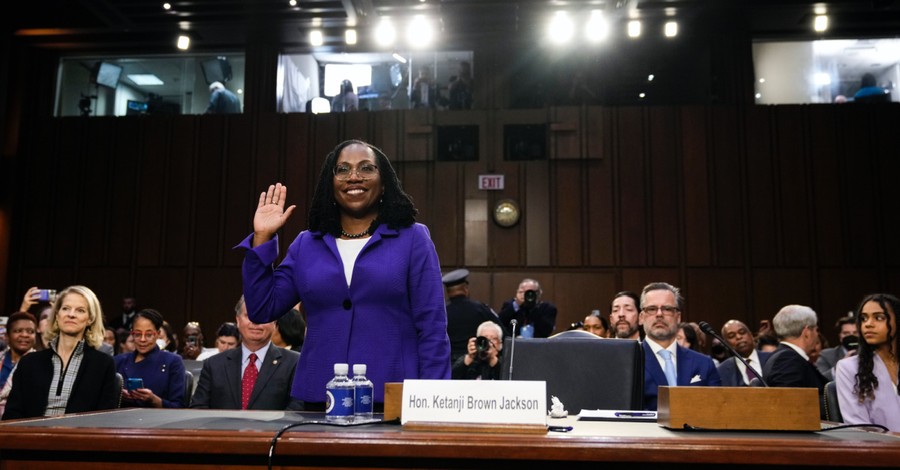
Supreme Court nominee Ketanji Brown Jackson on Tuesday called Roe v. Wade and another major abortion case "settled law," adding they have been "reaffirmed" by the nation's highest court multiple times and are "binding."
Jackson made the comments during the opening day of questions from the Senate Judiciary Committee, which is expected to vote on her nomination in the coming days before sending it to the full body. President Biden nominated her to replace the retiring Stephen Breyer.
Jackson's remarks about Roe are similar to those made by Justices Brett Kavanaugh and Amy Coney Barrett in their Senate hearings. Both were nominated by a Republican president.
It is assumed, though, that the judicial philosophy of Jackson would be different than that of Kavanaugh and Barrett.
Sen. Dianne Feinstein had asked Jackson to discuss Roe v. Wade (1973) and Planned Parenthood v. Casey (1992), which upheld Roe.
"I do agree with both Justice Kavanaugh and Justice Barrett on this issue," Jackson told Feinstein. "Roe and Casey are the settled law of the Supreme Court concerning the right to terminate a woman's pregnancy. They have established a framework that the court has reaffirmed. And in order to revisit, as Justice Barrett said, the Supreme Court looks at various factors, because stare decisis is a very important principle."
Stare decisis is the legal doctrine that courts will adhere to precedent in making their decisions.
"It provides and establishes predictability, stability," Jackson said of stare decisis. "It also serves as a restraint in this way on the exercise of judicial authority, because the court looks at whether or not precedents are relied upon whether they're workable, in addition to whether or not they're wrong, and other factors as well."
Feinstein then asked Jackson if she considers Roe to be a "super-precedent."
"All Supreme Court cases are precedential. They're binding," Jackson answered. "And their principles and their rulings have to be followed. Roe and Casey, as you say, have been reaffirmed by the court and have been relied upon – and reliance is one of the factors that the court considers when it seeks to revisit or when it's asked to revisit a precedent. And in all cases, those precedents of the Supreme Court would have to be reviewed pursuant to those factors because stare decisis is very important."
This week a coalition of nearly 40 pro-life leaders sent a letter to the chairs of the Senate Judiciary Committee expressing concern about Jackson's nomination. The letter notes that in 2001 Jackson co-authored a friend-of-the-court brief supporting a Massachusetts law that created a buffer zone around abortion clinics, thus limiting what pro-life sidewalk counselors could do. She represented the Massachusetts National Abortion Rights Action League and other pro-choice groups.
Related:
5 Things Christians Should Know about Supreme Court Nominee Ketanji Brown Jackson
Photo courtesy: ©Getty Images/Drew Angerer/Staff
Michael Foust has covered the intersection of faith and news for 20 years. His stories have appeared in Baptist Press, Christianity Today, The Christian Post, the Leaf-Chronicle, the Toronto Star and the Knoxville News-Sentinel.










